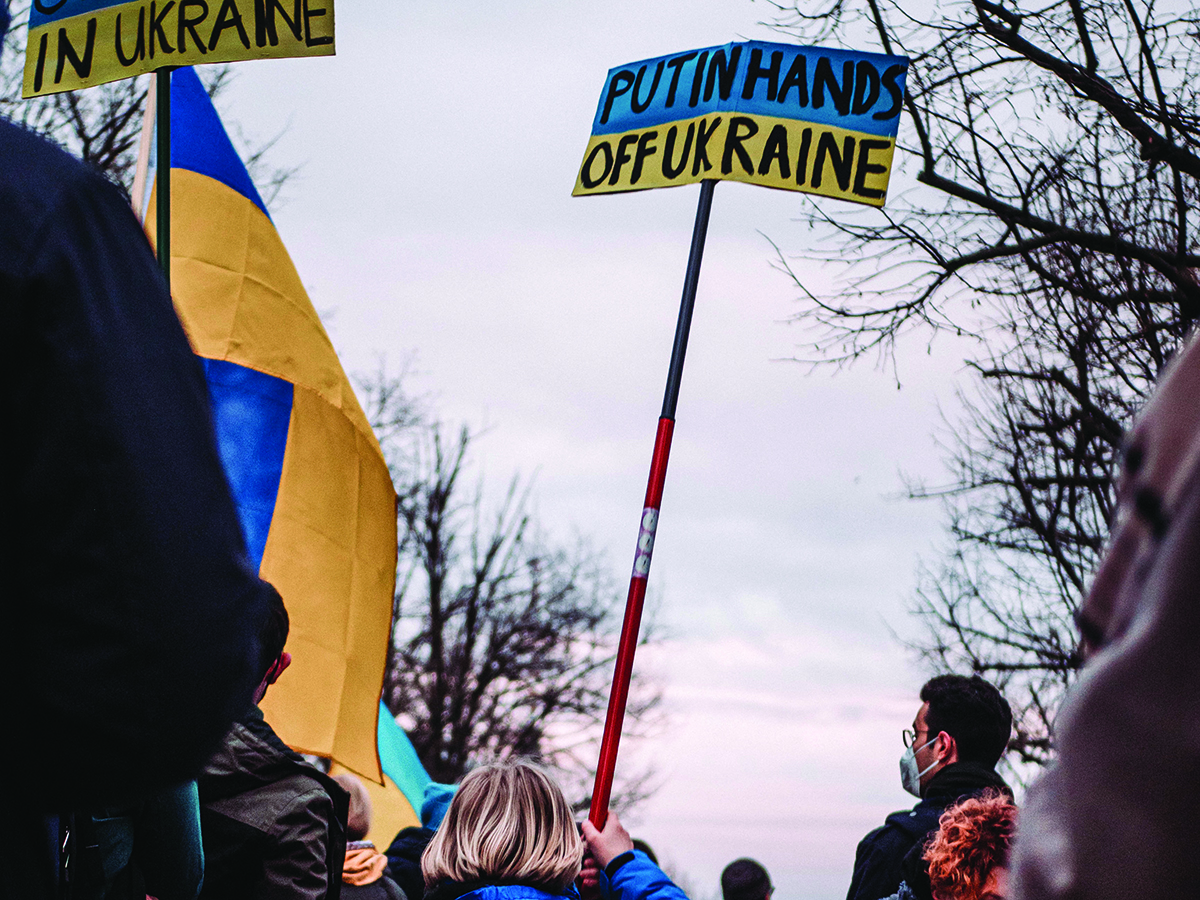The invasion of Ukraine is currently shaking society to its foundations. This extremely perilous and fragile geopolitical situation persists at the cost of civilian lives in the Ukrainian democratic state. This conflict is already a humanitarian catastrophe with over a million people fleeing or having fled from the war-torn country as of last week.
Ukraine gained independence in 1991 following the dissolution of the Soviet Union. In the 1994 Budapest Memorandum, Britain, Russia and the United States promised to “respect the independence and sovereignty and the existing borders of Ukraine” while refraining from the use of force as long as Ukraine gave up its nuclear weapons. In return, Ukraine was promised security and protection. If Russia was ever to violate the Budapest Memorandum, U.S. officials assured Ukraine that they would take a “strong interest” and respond accordingly.
The Russian elites, Putin in particular, do not see Ukraine as an independent country, and see the separation of Ukraine from Russia not only as a historical and religious disaster, but one that is maintained by a historical enemy. Putin sees the fact that Ukraine has not come back to the Russian fold as largely a result of Western plotting, particularly by the U.S.
On Friday Mar. 4, Russian forces seized Ukraine’s Zaporizhzhya nuclear power plant, the largest in Europe sparking fears of a nuclear catastrophe worse than the 1986 Chernobyl disaster. Invading Russian troops have laid siege to key Ukrainian cities including Mariupol and Kharkiv, leaving cities like Chernihiv descemated by air strikes. Ukrainian President Zelensky urged world leaders to stop Russia.
During his first official State of the Union address on March 1, 2022, Biden announced that the U.S. stands with Ukraine and reiterated that Putin’s attack was premeditated and unprovoked. In response, the U.S. is enforcing sanctions, cutting off their banking, limiting Russia’s access to technology to weaken its military, seizing their assets and joining allies in closing American airspace for any Russian flights. The U.S. is providing military, economic and humanitarian assistance to Ukraine. Biden vowed to continue to aid the Ukrainian people as they defend their country.
One of the most severe sanctions is the Central Bank of Russia being prevented from accessing its reserves in euros and dollars; roughly half of Russia’s $640 billion reserves have been effectively frozen. This is a National Strategic buffer. With its financial system and currency under pressure, Russia will be unable to access these reserves which are denominated in foreign currencies. Some Russian backs will be disconnected from the SWIFT global financial messaging system making it difficult for Russia to make secure cross-border payments. Travel bans and asset freezing are directed at financial elites, political officials and members of Putin’s inner circle.

Paul D’Anieri, a UCR professor of political science and international policy who specializes in Ukrainian and Russian conflict spoke with The Highlander regarding the ongoing war. In regards to sanctions, professor D’Anieri does not believe in their effectiveness.
“Sanctions are highly effective but won’t stop Russia waging their war on Ukraine. It will make it hard for Russia to prolong this war but Putin is willing to see this through to the end even at the cost of civilian lives,” professor D’Anieri told The Highlander. This has been indicated by over 20 years of economic pressures, political pressures, haranguing various countries, small conflicts and now this war to seize Ukraine.
When asked how America can maintain an anti-war stance in this conflict, and play a constructive role in the maintenance of peace and security both regionally and globally, professor D’Anieri responded that the U.S.’s involvement in Afghanistan and Vietnam undermine the credibility of their position. “Russia’s invasion is wrong and we are capable of doing something about it. There is power in the number of countries working together.”
This war is especially prevalent as many young people are seeing it unfold through the lens of the internet. Sites like Tiktok and Twitter are allowing people to see real time footage and hear first hand stories from refugees and even military members. This however, opens those consuming this media to the possibility of fake news. Professor D’Anieri states that it is unrealistic to expect credible news just scrolling on your phone. “If you are not paying for your news, you are the product.” Professor D’Anieri suggests students consume information from reputable news companies or verified journalists.
There have also been reports of differential treatment towards refugees that are people of color trying to flee Ukraine and find sanctuary in neighboring countries. “I don’t doubt these reports,” claimed professor D’Anieri. “America isn’t the only place that has these issues… it is sad to be in a situation and have additional difficulty because of racism.”
As the war progresses, it is important to not ostracize Ukrainian or Russian diaspora living in the U.S. or other countries. It is also important to acknowledge the differential treatment of white refugees versus others. Poland and Hungary are currently refusing to let in African and Middle Eastern refugees reinstating racism during a time of crisis.
“We should give attention to these refugees when they have needs and when there is a lack of consistency in America’s treatment of refugees, especially when it comes to the difference of race,” states professor D’Anieri.
Other catastrophes around the world have received substantially less coverage compared to this war due to them not having predominantly white populations. As you intake coverage of this event, be mindful of other ongoing crises.
Assistant News Editor Amaray Alvarez also contributed to this article.









